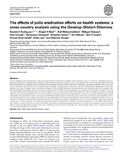| dc.contributor.author | Rodriguez, Daniela C | |
| dc.contributor.author | Neel, Abigail H | |
| dc.contributor.author | Mahendradhata, Yodi | |
| dc.contributor.author | Deressa, Wakgari | |
| dc.contributor.author | Owoaje, Eme | |
| dc.contributor.author | Akinyemi, Oluwaseun | |
| dc.contributor.author | Sarker, Malabika | |
| dc.contributor.author | Mafuta, Eric | |
| dc.contributor.author | Gupta, Shiv D | |
| dc.contributor.author | Salehi, Ahmad Shah | |
| dc.contributor.author | Jain, Anika | |
| dc.contributor.author | Alonge, Olakunle | |
| dc.date.accessioned | 2022-07-24T08:21:36Z | |
| dc.date.available | 2022-07-24T08:21:36Z | |
| dc.date.copyright | 2021 | |
| dc.date.issued | 2021-04-21 | |
| dc.identifier.citation | Rodriguez, D. C., Neel, A. H., Mahendradhata, Y., Deressa, W., Owoaje, E., Akinyemi, O., . . . Alonge, O. (2021). The effects of polio eradication efforts on health systems: A cross-country analysis using the develop-distort dilemma. Health Policy and Planning, 36(5), 707-719. doi:10.1093/heapol/czab044 | en_US |
| dc.identifier.uri | http://hdl.handle.net/10361/17029 | |
| dc.description | This article was published in Health Policy and Planning by Oxford Academic [© The Author(s) 2021. Published by Oxford University Press in association with The London School of Hygiene and Tropical Medicine.] and the definite version is available at: https://doi.org/10.1093/heapol/czab044 The Journal's website is at: https://academic.oup.com/heapol/article/36/5/707/6244781 | en_US |
| dc.description.abstract | Vertical disease control programmes have enormous potential to benefit or weaken health systems, and it is critical to understand how programmes’ design and implementation impact the health systems and communities in which they operate. We use the Develop–Distort Dilemma (DDD) framework to understand how the Global Polio Eradication Initiative (GPEI) distorted or developed local health systems. We include document review and 176 interviews with respondents at the global level and across seven focus countries (Afghanistan, Bangladesh, Democratic Republic of Congo, Ethiopia, India, Indonesia and Nigeria). We use DDD domains, contextual factors and transition planning to analyse interactions between the broader context, local health systems and the GPEI to identify changes. Our analysis confirms earlier research including improved health worker, laboratory and surveillance capacity, monitoring and accountability, and efforts to reach vulnerable populations, whereas distortions include shifting attention from routine health services and distorting local payment and incentives structures. New findings highlight how global-level governance structures evolved and affected national actors; issues of country ownership, including for data systems, where the polio programme is not indigenously financed; how expectations of success have affected implementation at programme and community level; and unresolved tensions around transition planning. The decoupling of polio eradication from routine immunization, in particular, plays an outsize role in these issues as it removed attention from system strengthening. In addition to drawing lessons from the GPEI experience for other efforts, we also reflect on the use of the DDD framework for assessing programmes and their system-level impacts. Future eradication efforts should be approached carefully, and new initiatives of any kind should leverage the existing health system while considering equity, inclusion and transition from the start. | en_US |
| dc.language.iso | en_US | en_US |
| dc.publisher | Oxford Academic | en_US |
| dc.relation.uri | https://academic.oup.com/heapol/article/36/5/707/6244781 | |
| dc.subject | Polio | en_US |
| dc.subject | Health systems | en_US |
| dc.subject | Political economy | en_US |
| dc.subject | Context | en_US |
| dc.title | The effects of polio eradication efforts on health systems: A cross-country analysis using the Develop–Distort Dilemma | en_US |
| dc.type | Thesis | en_US |
| dc.description.version | Published | |
| dc.contributor.department | Brac James P. Grant School of Public Health | |
| dc.identifier.doi | https://doi.org/10.1093/heapol/czab044 | |
| dc.relation.journal | Health Policy and Planning | |

